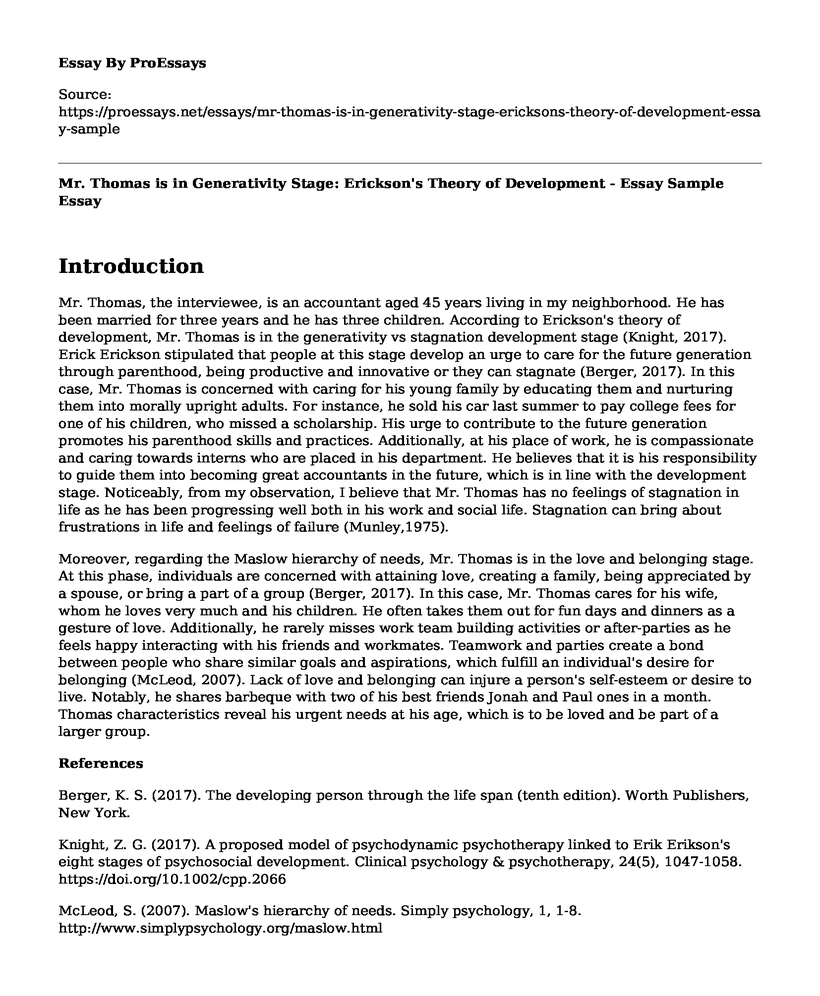Introduction
Mr. Thomas, the interviewee, is an accountant aged 45 years living in my neighborhood. He has been married for three years and he has three children. According to Erickson's theory of development, Mr. Thomas is in the generativity vs stagnation development stage (Knight, 2017). Erick Erickson stipulated that people at this stage develop an urge to care for the future generation through parenthood, being productive and innovative or they can stagnate (Berger, 2017). In this case, Mr. Thomas is concerned with caring for his young family by educating them and nurturing them into morally upright adults. For instance, he sold his car last summer to pay college fees for one of his children, who missed a scholarship. His urge to contribute to the future generation promotes his parenthood skills and practices. Additionally, at his place of work, he is compassionate and caring towards interns who are placed in his department. He believes that it is his responsibility to guide them into becoming great accountants in the future, which is in line with the development stage. Noticeably, from my observation, I believe that Mr. Thomas has no feelings of stagnation in life as he has been progressing well both in his work and social life. Stagnation can bring about frustrations in life and feelings of failure (Munley,1975).
Moreover, regarding the Maslow hierarchy of needs, Mr. Thomas is in the love and belonging stage. At this phase, individuals are concerned with attaining love, creating a family, being appreciated by a spouse, or bring a part of a group (Berger, 2017). In this case, Mr. Thomas cares for his wife, whom he loves very much and his children. He often takes them out for fun days and dinners as a gesture of love. Additionally, he rarely misses work team building activities or after-parties as he feels happy interacting with his friends and workmates. Teamwork and parties create a bond between people who share similar goals and aspirations, which fulfill an individual's desire for belonging (McLeod, 2007). Lack of love and belonging can injure a person's self-esteem or desire to live. Notably, he shares barbeque with two of his best friends Jonah and Paul ones in a month. Thomas characteristics reveal his urgent needs at his age, which is to be loved and be part of a larger group.
References
Berger, K. S. (2017). The developing person through the life span (tenth edition). Worth Publishers, New York.
Knight, Z. G. (2017). A proposed model of psychodynamic psychotherapy linked to Erik Erikson's eight stages of psychosocial development. Clinical psychology & psychotherapy, 24(5), 1047-1058. https://doi.org/10.1002/cpp.2066
McLeod, S. (2007). Maslow's hierarchy of needs. Simply psychology, 1, 1-8. http://www.simplypsychology.org/maslow.html
Munley, P. H. (1975). Erik Erikson's theory of psychosocial development and vocational behavior. Journal of Counseling Psychology, 22(4), 314. https://doi.org/10.1037/h0076749
Cite this page
Mr. Thomas is in Generativity Stage: Erickson's Theory of Development - Essay Sample. (2023, Jul 19). Retrieved from https://proessays.net/essays/mr-thomas-is-in-generativity-stage-ericksons-theory-of-development-essay-sample
If you are the original author of this essay and no longer wish to have it published on the ProEssays website, please click below to request its removal:
- Questions and Answers on Kant
- Essay Sample on Morality and Ethics in Business
- Essay Sample on Life Scripts
- Social Identity and Self-Categorization - Research Paper
- Essay Sample on Ethical Standards: A Guide to Doing Things Right
- Nietzsche in Vienna: Yalom's Splendid Subject - Essay Sample
- Identity: Understanding Ourselves & Configuring Ourselves in Relationships - Essay Sample







